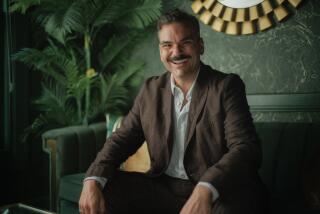Shedding the Weight of the Past : ST. BURL’S OBITUARY.<i> By Dan Akst (MacMurray & Beck: $22.95, 270 pp.)</i>
In “St. Burl’s Obituary,” Daniel Akst has crafted a remarkable novel that gives life to Cyril Connolly’s adage that “imprisoned in every fat man, a thin one is wildly signaling to be let out.”
The protagonist, Burl Bennett, is marooned inside a morbid obesity. A prolonged celibate, his only joy occurs with fork in hand. Burl, 35, writes obituaries for a New York newspaper, and he ascribes all sensations to taste. On the way to a repast, he imagines the fare:
“He would have the fried squid in hot sauce, a Caesar salad, clams in that gray salty broth so good you used bread to sop up the liquor, and finally the veal saltimbocca, slender elegances of flesh blanched in wine and butter, draped in mozzarella and crowned with swirls of salty red and white prosciutto. . . .”
Burl’s lone friendship is with a female colleague. Yet rather than move forward romantically, his relationship with Norma remains stalled at arm’s length, separated by his girth. “Can’t a fat man love?” he wonders, leaving her apartment sideways in order to wedge through the door.
Burl is sinking inside a sea of sauces and self-pity, and a life preserver is needed. Fate throws him one when by chance he enters a restaurant just as the killer of three diners is fleeing. The encounter triggers events that undermine the gluttonous inertia of Burl’s world.
Realizing he can identify the killer, Burl worries he may be silenced in turn. Panicked, he embarks on a fugue across America, a Rabelaisian journey punctuated not by tourist sites but by roadside restaurants. At the end, he is a completely transformed person, both spiritually and physically. Rather than simply portray Burl’s world realistically, Akst’s stunning allegory of self-transformation goes one step further: We decipher the hidden meanings, the concealed patterns, of our own lives by watching Burl dramatically change his.
In Salt Lake City, he finds work at a Laundromat, where the slender Tongan manager adores fat men. Eluding his clutches, Burl is soon befriended by a waitress who is part of a local cult. He knows he doesn’t stand a chance of winning her as long as he resembles a human balloon. So, responding to a newspaper advertisement seeking obese volunteers for an experimental weight-loss program, Burl decides it’s time for a big change.
He undergoes banded gastroplasty and begins to shed pounds. Within a few months, Burl loses an average man’s body weight. Yet, “even though the transformation he saw was gradual,” writes Akst, a Los Angeles Times columnist, “it came upon him with the force of a death.”
The void that Burl once silenced with food now needs spiritual nourishment. Ultimately, he returns home and, mistakenly thought to be dead, he reads his own obituary in the paper for which he once worked. Bearded, wearing glasses, a sliver of the man he once was, Burl turns up at his own memorial service. In a final scene, he confronts the great secret of his life--the reason why he became fat. Only then does he shed the literal and figurative weight of the past.
Pascal once wrote: “No two men differ as much as one man does from his former self.” He might have added that such transformation owes less to will than it does to acceptance. That’s one of the lessons of “St. Burl’s Obituary,” the tale of a man slipping away from the fortress of his body to find freedom and love in the world beyond.
For readers, it’s a journey worth taking.
More to Read
Sign up for our Book Club newsletter
Get the latest news, events and more from the Los Angeles Times Book Club, and help us get L.A. reading and talking.
You may occasionally receive promotional content from the Los Angeles Times.








